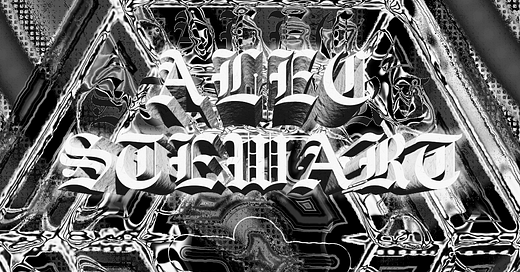Alec Stewart wrote us a profound email on addiction and design a couple years ago (we’ve shared it below). Both of us had known of Alec at RISD, where he studied as an undergrad during our time as graduate students. At the time he possessed a great energy and creativity that we found envious. We had little idea he was also struggling with addiction and great inner turmoil all the while. A now sober and radically open Stewart shares his path to recovery and how he maintains his sobriety despite the never ending threat of a relapse. The surprising thing about Alec’s story is how relevant his struggles are to the unhealthy trappings and myths of design practice and the cycle of self loathing and burnout from overworking.
Our obsession and addiction to long hours and “passion” are truly destructive to our health and well being. We’re dangerously committed to a belief that creativity comes from struggle and that greatness only comes by going over the edge. Alec shares his discovery of this falsehood, and also discusses how he inversely applies design thinking to create boundaries for himself and his life.
We’re super thankful for Alec for being so open and direct with us. He brings his humor and wit to a difficult story.
We can’t thank him enough.
Disclaimer: This episode contains accounts of addiction and substance abuse. If you or someone you love is struggling with addiction or substance abuse, please visit usa.gov/substance-abuse for resources and support. Help is out there.
—
ALEC STEWART -
On understanding addiction, radical sobriety & brutalist design
To begin - I will introduce myself in the manner of AA: Hello my name is Alec and I’m an Alcoholic. I suffer from addiction - it’s a fact and I am not afraid to admit that. It’s a part of who I am and the more I begin to understand my own addiction, the easier those words come. Where before I was ashamed to admit my own struggles, now I feel relief to tell people who I really am. A lot of that initial shame came from the incredible amount of negative connotations that surround Addiction. In western culture it is often looked down upon as a moral failing, a deficiency of character. I personally see it as a disease. Something that needs to be continuously treated, healed, and rehabilitated. There’s nothing wrong with having addiction, it merely is. I suffer from the disease of alcoholism, just as someone else may suffer from diabetes.
When you take Alcoholism, and consider it in the lens of disease, you can analyze its symptoms like any other health condition. To define the symptoms of Alcoholism is tricky. Alcoholism is complicated and multifaceted, both highly personal and universal. I think there’s several overarching principles that every alcoholic shares when in active addiction: uncontrollable compulsion, self-isolation, attachment, ego, and an inability to love oneself. I am happy to expand on any of these symptoms and its relation if needed.
I also believe, you don’t need to be addicted to Alcohol to be considered an Alcoholic. I think there are base symptoms of the disease in people who’ve never touched a drop of alcohol. Addiction can manifest in many ways. With designers for example, it can appear as an addiction to work. This is a super common reality for designers. Many of us throw ourselves into work at the expense of ourselves. Forgoing our basic needs in order to keep designing. Burning out our burnout. That compulsion to work and keep working is not any different than the compulsion to drink. They are both incredibly unhealthy, and they both need to be treated. I think when we overwork ourselves, we lean into the symptoms of compulsion, attachment, and ego. We work obsessively, we attach to our designs / ideas / inspirations / whatever, we sacrifice ourselves to be the best - craving the respect of our peers over the contentment of where we are. Yuck. You’d be hard pressed to find a designer that hasn’t dwelled in one of these symptoms.
The only way to mitigate these symptoms is through sobriety. Sobriety is not just abstinence from a substance, it’s a way of being. It’s admitting oneself is powerless over the disease and figuring out a healthier way of living. There’s a guide to it in AA called the 12 steps. They are written in relation to Alcoholism, but they still are a pretty decent thing to work through - whether you struggle with alcohol addiction or not.
Outside of the 12 steps, my personal sobriety involves a lot of guard rails, a grid system applied to my life. These involve various ways for me to avoid triggers and mitigate compulsions. Some days I’m successful, some days I’m not. I just figure it out one day at a time. They are all involved in making sure I maintain a healthy mind, body, and soul. My significant other and I have a mantra: The best way to tell someone you love them is to love yourself. The best way to take care of someone is to take care of yourself. I apply the personal responsibility of taking care of myself everyday, so I have the ability to take care of those around me.
To give an example of one of my guardrails - I no longer allow myself to have social media. I deleted my instagram. I realized I was using my instagram to find validation for my work through others, validation I couldn’t give myself. I thought that if others liked my work they inversely liked me too. Super twisted, backwards way of thinking. I still struggle with making work for myself. It’s hard for me to detach from the approval of my peers and try to allow myself the grace to give myself that approval. That is all rooted in the inability to love myself.
My personal design practice is also rooted in my sobriety. Both in the design movement I work within, and how I use design in relation to my mental well being. My personal practice in graphic design is in Brutalism. I see brutalism as truthful. It presents itself as it is - no frills, no gimmicks, no bullshit. It’s starkness holds honesty. That rigorous honesty is necessary for me in every aspect of my life in order to maintain abstinence from alcohol, so it also makes sense that I would apply that same honesty to my design practice as well.
In relation to my mental well being, I use my designs to filter my compulsions. I take the thoughts I am obsessing over and apply them to my designs. You can directly see how my work visually changes depending on my mental health. The more manic and unhealthy I am, the more chaotic and out of control my designs become. My computer screen is a mirror for me to see how upside down and inside out I am at any given time.
That said, I will addictively design if given the opportunity too. Anything healthy, I can make unhealthy on the flip of a dime. This whole year I have been actively practicing stepping away from the screen. After designing for a decade, I am still trying to figure out how to work in a healthy manner. My hope is that one day I can be happy enough with what I make, that I won’t have to make at all.
In the manner of AA, I think we should end with a prayer -
Grant me the serenity to accept Photoshop crashes, the courage to not name my files FINAL_FINAL_FINAL, and the will to not burn myself out - Amen
Related info I did not include in the above write up that I can talk about if you want me too:
I have been placed on adult time out twice. I have done both an intensive impatient program, and a detox. I have been an alcoholic since college. I have done IOP, AA, and all the Jazz. I am happy to explain them or my experiences with them. I can talk about how fucking luny rehab is, how much I drank to end up in rehab, or the absolute cartoon characters of human beings I’ve met in rehab. I can clarify any AA lingo or address its weird roots in christianity. I can talk about relapses, prolonged amounts of sobriety, or anything in-between. Basically anything related to me being an utter goofball of a human and a digital cowboy of a designer I’m happy to touch upon.
Thanks for reading - Cheers!














Share this post